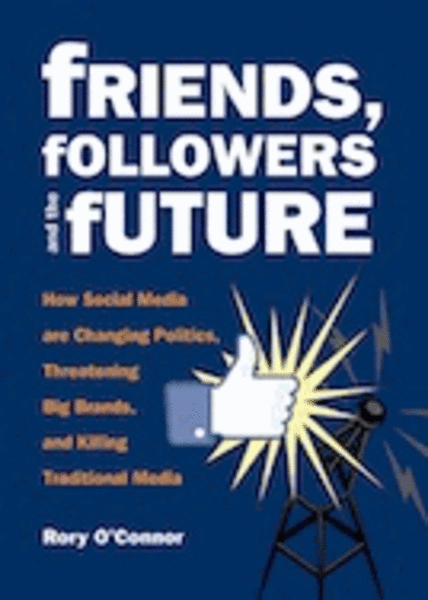The subtitle of Friends, Followers and the Future ($15.95, City Lights Publishers), a book coming out today by Emmy-winning journalist Rory O’Connor, has a dark ring to it. “How Social Media are Changing Politics, Threatening Big Brands, and Killing Traditional Media” conjures up images of everything changing, and not necessarily for the good.

But the book itself seems split on whether social media – and the challenges it presents to our old-line institutions – are good or evil. All at once, O’Connor seems amazed by YouTube, okay with the speed over accuracy rule of news distribution on Twitter and concerned with the typical laundry list of privacy violations committed by Facebook, Google and other big, digital media players.
I’m OK with those parts of the book. Like a lot of people and, apparently, like O’Connor, I raise concerns about privacy and Facebook while still checking it a few times each day. I worry about whether the filter bubble limits my news diet, but still find myself clicking on headlines that seem like they were tailor-made for my interests. I worry about the accuracy of sensational tweets, yet find myself checking Twitter when I’m stuck for something to write about.
In reviewing Friends, Followers and the Future, the Boston Globe’s Hiawatha Bray noted that it seemed too basic for the tech-savvy reader – the kind of people who “punch up websites like Techmeme and GigaOM first thing in the morning” and, presumably, are also fans of ReadWriteWeb.
“O’Connor offers a portrait of the current digital landscape as well as the historical context in an efficient, but pedestrian way,” Bray wrote. “His book is devoid of original insights and unexpected observations. I felt as though I was reading back issues of Wired magazine or the technology sections of last year’s newspapers.”
That assessment starts to speak to my problems with the book, and also raises a broader question: Is it even possible to write a book about an industry that changes as quickly as social media?
Book Publishers Will Struggle To Break Social Media News
The book’s official publication date is today, but Friends, Followers and the Future has been available on Amazon for the past several weeks. And it was clearly rushed to press: I counted no fewer than 12 typos, a sure-fire sign that the book was pushed through the editing process at breakneck speed. I was willing to forgive them because, ultimately, O’Connor has an engaging, straightforward writing style and this book will be a solid reference of what social media looked like in 2011, complete with a history of the sector up to that point..
The book references news events that happened in late 2011, but think of everything that has happened since then: Facebook filed for an IPO and spent $1 billion to acquire Instagram, an app many of us were only hearing about for the first time when O’Connor was most likely sending proofed galleys back to his publisher. Twitter has remade TweetDeck, said it wouldn’t file for an IPO and publicly acknowledged difficulties in generating revenue.
And, oh yeah, have you heard about Pinterest? The breakout social media hit of 2012 doesn’t even warrant a mention in O’Connor’s book, in large part because it was just starting to make it onto the radar screens of the mainstream tech press by the end of 2011.
In daily journalism, we talk about “evergreen” stories. Those are the explanatory stories and features that can hold for a day, a week or even a month or two because they aren’t necessarily time-sensitive. Books were once the place to tell the truly evergreen stories – the ones that are more in-depth and more likely to stand the test of time.
Changes in publishing and profit models make that less so now, but books are still supposed to have a longer shelf life than, say, this blog post. Books like O’Connor’s – or at least his voice, research and perspective – would have been more useful to me three, four or five months ago. But in tech in general – and in social media specifically – the landscape changes too damn fast.










